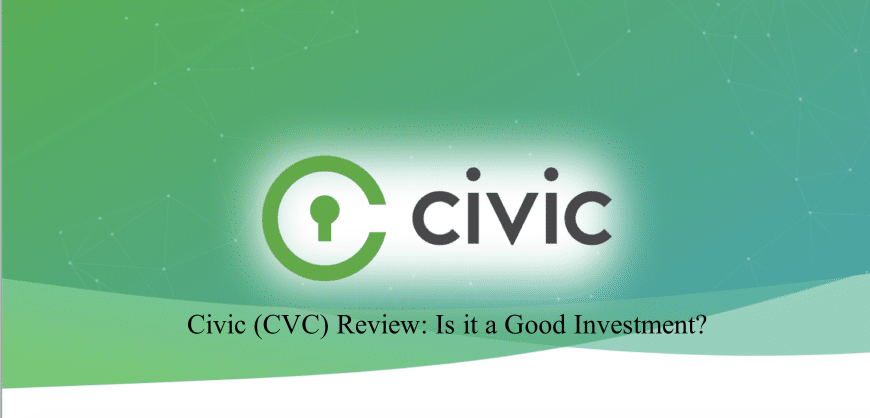
Civic (CVC) is an AI-powered identity verification protocol. The platform leverages the security of blockchain technology to provide businesses and individuals a more secure and efficient way to protect identities. This strategy enables developers to create more effective Dapps to service the market. As such, Civic has seen growing adoption since its launch.
History of Civic (CVC)
Civic (CVC) officially entered the market in July 2017 via a public crowdsale. The network was founded by Vinny Lingham and Jonathon Smith. Notably, Lingham has long been a pioneer in the eCommerce sector. Most notably, he founded the digital gift card platform, Gyft, which was acquired by First Data Corporation in 2014.
Smith also has a long history in banking and technology. He has worked as an advisor for multiple innovative platforms. His experience helped him to structure Civic in a secure and efficient manner. Additionally, the company’s executive staff is filled with senior finance officials and tech-heads.
What Problems Does Civic (CVC) Attempt to Fix?
There are a lot of vital issues that Civic seeks to eliminate. For one, the protocol protects users from the growing risks of data breaches. Every year, millions of people have their personal information stolen due to hacks. Civic protects users from this occurrence because it enables individuals and businesses to verify identity without storing any personal data directly. Since there are no personally identifiable information (PII) databases, hackers have no way to steal this information.
Regulatory
Another problem that Civic handles is the meeting of regulatory requirements. More and more platforms are requiring users to meet KYC & AML compliance to participate in DeFi and public blockchains. Civic automatically handles these procedures during the user’s sign-up. Since the platform conducts all the anti-money laundering (AML) and sanctions checks required, third-party apps can save on conducting these activities directly.
Benefits of Civic (CVC)
There are a ton of benefits this strategy introduces to the market. For one, it adds to the overall convenience by creating a more streamlined user experience. Developers can create more robust apps when they are confident their mobile user onboarding protocols meet international compliance requirements.
Streamline Onboarding
Another major advantage of Civic (CVC) is its quick response time. Users can get verified in minutes from their mobile devices. You can achieve verification by submitting any of the 4500 identity documents accepted. Additionally, the platform takes a global approach by including documentation from across 195 countries. Notably, you can also verify emails and phone numbers using the system.
Biometrics
For those seeking even more efficiency, the platform supports advanced biometric features. Specifically, you can utilize 3d face matching for photo verification. There is also a new liveness detection system that ensures the users attempting to utilize your Dapp is a real person and not a bot.
Eliminate Bots
Bots are one of Dapp developer’s biggest enemies. There are bots that serve all types of purposes in the market today. These bots can steal trade secrets, bog down networks, and target your users. Through the integration of biometrics comparisons, liveness checks, and document verification, Civic (CVC) eliminates bots from the equation.
Privacy
Keeping user’s privacy and data security is a top priority for Civic. The protocol complies with international data privacy regulations including GDPR and CCPA. Notably, General Data Protection Regulation (GDPR) is regarded as the toughest privacy and security law in the world currently.
Security
As part of its advanced security structure, Civic relies on AES-256 encryption and TLS protocols. Both of these systems have been proven to be highly effective at protecting data. Notably, AES-256 has a key length of 256 bits. As such, it supports the largest bit size. Consequently, it’s practically unbreakable by brute force based on current computer standards.
How Does Civic (CVC) Work
Civic operates as an Ethereum-based protocol. It enjoys the security of the world’s second-largest blockchain. Ethereum provides Civic with a host of benefits. One of the main advantages of this strategy is interoperability. Civic users can leverage the full spectrum of ERC-20 compatible wallets, Dapps, and DEXs (decentralized exchanges) available in the market. This added interoperability improves the user experience and introduces more ROI opportunities.
Notably, Civic (CVC) is unique in that it leverages an advanced AI-powered identity verifications system, coupled with human review. This combination improves the overall performance of the network as the AI speeds up the initial compliance actions. Notably, adding the final human approval to the equation adds another level of security.
Identity Verification
The main product of the network is the Civic Wallet. This protocol streamlines the verification process in multiple ways. For one, it eliminates human error and fakes. Businesses can integrate the Civic Wallet Directly at their entrance in the case of bars or registers for other applications.
Age Verification
The Civic Wallet also provides an age verification system. This feature integrates directly into a company’s POS systems. Stores can save big time in penalties and other costs when they integrate Civic.
CVC
CVC operates as the main utility token for the network. Users can send value across the globe in seconds using this cryptocurrency. Additionally, you must hold CVC to utilize the network’s features and services. CVC is an ERC-20 compliant token that lives on the Ethereum blockchain. The firm issued 1 billion CVC tokens in total. Of these, 330 million CVC were sold during the firm’s token sale.
Bottom Line
Civic (CVC) seeks to transform the market in many ways. Both vendors and users enjoy more security and convenience when they incorporate this system into their business model. For these reasons, you can expect to see more firms follow suit as Civic’s benefits become better understood in the market.



















